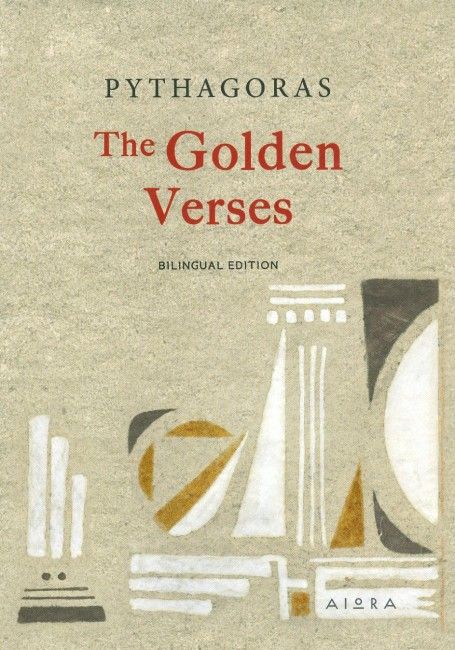The Golden Verses - Pythagoras (Bilingual)
Ο Πυθαγόρας δεν έγραψε τίποτα όσο ζούσε. Ούτε καν το πυθαγόρειο θεώρημα. Κι όμως η γνώση και η σοφία του άλλαξαν τον κόσμο κι έφτασαν ως τις μέρες μας. Απόσταγμα της διδασκαλίας του θεωρούνται τα «χρυσά έπη», εβδομήντα ένα δίστιχα - πυξίδα για τη ζωή. Λειτουργώντας ως προτροπή, ρίχνουν σε μία κοίτη το ανθρώπινο και το θεϊκό στοιχείο. Ορίζουν το σημείο σύγκλισης των δύο και μας δείχνουν πώς να κατακτήσουμε την ανώτερη αρετή στην καθημερινή πρακτική μας.
Δίγλωσση έκδοση με σκληρό εξώφυλλο
[from the Introduction]
PYTHAGOREAN WAY OF LIFE
The testimonies of Plato and Isocrates show that Pythagoras was famous because he left as his legacy a way of life that continued to have supporters in the fourth century BC, in other words, a hundred years after his death!
Pythagoras concerned himself in particular with religious rites. Isocrates emphasized that Pythagoras, above anyone else, attached importance to sacrifices and temple rituals. Evidently, his interest in the journey of the soul after death required profound knowledge of all the rites connected with death. The Pythagorean way of life attached particular importance to the assiduous observance of religious rites; however, it was not a religion and there were no specific Pythagorean rituals. Pythagoras most probably taught a way of life that gave emphasis to particular aspects of ancient Greek religion.
A second characteristic of the way of life that he propounded was the fact that he attached great importance to dietary rules. There is no evidence concerning these rules before Aristotle, but both he and Aristoxenus make detailed references. Unfortunately, once again we are faced with contradictions in the accounts and so are unable to draw any safe conclusions. There are those who claim that Pythagoras was an advocate of vegetarianism, based on his belief in the reincarnation of souls. Eudoxus, a fourth-century mathematician and philosopher, relates that Pythagoras not only abstained from the eating of meat, but also avoided butchers and hunters.
According to Dicaearchus, one of Pythagoras ’ s most well-known doctrines was that all living beings belong to the same family. Aristotle, however, relates that the Pythagoreans refrain from eating certain kind of offal (e.g., the heart), sea anemone and some other kinds of food, but not all animal products.
Apart from dietary rules, the sacrifice of animals was a common practice in ancient Greek religious worship. Aristotle mentions the following acusma: in answer to the question, ‘What of all is most befitting?’ Pythagoras replied, ‘To sacrifice.’ And because, in accordance with the evidence of both Aristotle and Aristoxenus, the consumption of meat was not totally prohibited, it is probable that eating the meat of sacrificial animals was permitted.
Perhaps the most well-known dietary restriction attributed to Pythagoras was the forbiddance of beans, first attested to by Aristotle.
| Pages | 112 |
|---|---|
| Publication Date | 2015 |
| Publisher | ΑΙΩΡΑ / AIORA |
| ISBN | 9786185048693 |
| Binding | Hardback |
| Author | Pythagoras / David Connolly / Theodora Pasachidou |
Couldn't load pickup availability
- Available collection from our Sheffield premises
Share

ALL GOODS TRAVEL WITH THE RESPONSIBILITY OF THE CUSTOMER


